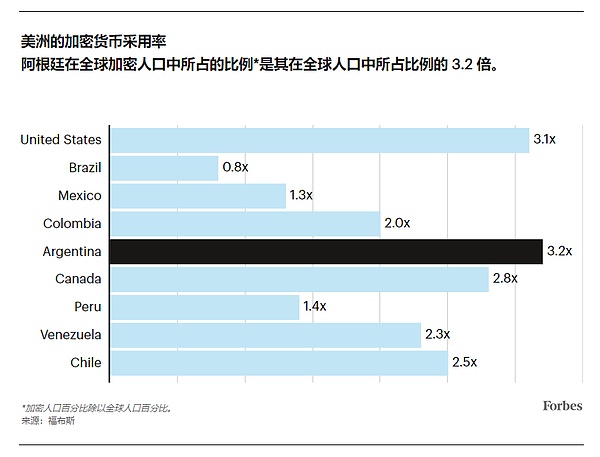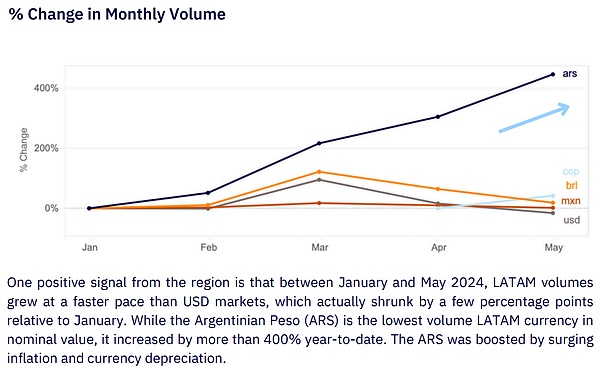Source: Aiying Payment Compliance
The Central Bank of Argentina recently announced a new policy to sell dollars on the unofficial foreign exchange market to combat rising inflation and control the money supply. The news was released by Economy Minister Luis Caputo on the social media platform X, who said the measure would help further slow inflation and called it a historic innovation in Argentina's economic management. Starting next Monday, the Central Bank will buy dollars with pesos on the official foreign exchange market while selling an equal amount of dollars on the "CCL" unofficial market to keep the money supply balanced. Caputo stressed that Argentina will no longer solve the problem by printing more pesos, calling this move a "final blow" with the goal of defeating inflation once and for all.
As for the effectiveness of this measure, the innovation is serious. Aiying systematically sorted out the current economic situation and the current situation of the cryptocurrency market in Argentina, so that everyone can have a comprehensive understanding of this special market in Argentina.
Part I: Argentina’s Economic Background
I. Current Situation of Inflation

Argentina’s inflation rate soared to 104.3% in the year to March (Photo: tradingeconomics)
Argentina is currently facing a serious inflation problem, with an inflation rate of 276%. This means that the prices of goods and services have soared, bringing great pressure to the lives of ordinary people. Take beef as an example. As an important part of Argentina’s food culture, the price of beef has risen to a point that many people cannot afford. Steak, which used to be available everywhere, has now become a luxury. Many families have to turn to relatively cheap pork and chicken to cope with the rising cost of food.
Second, the history of the peso’s devaluation
Since Argentina ended its 1:1 peg to the dollar in 2002, the devaluation of the peso has plagued the country. The policy change at the time led to a rapid devaluation of the peso, which triggered a series of economic problems. In 2002, 1 US dollar could be exchanged for about 4 pesos, and by the time the COVID-19 outbreak hit in 2020, the exchange rate had reached 1 US dollar to 64 pesos.
In the past few years, the peso’s devaluation has become more severe. By the end of 2023, the exchange rate of 1 US dollar to 1 peso had reached about 350 pesos. In early 2024, the new president Javier Milley adopted a series of "economic shock therapies", including a sharp devaluation of the peso. As a result, the peso’s exchange rate against the dollar further depreciated by more than 50%, leading to a more complicated economic situation in Argentina.
While the devaluation of the peso briefly boosted trade growth in the early 2000s, this benefit gradually disappeared after 2009. Over the past decade, Argentina's economic performance has continued to be sluggish, with inflation-adjusted GDP falling by an average of 0.1% per year, with only four years of growth.
This continued currency depreciation has had a profound impact on Argentina's economy. Many Argentines have lost confidence in their own currency and have turned to the US dollar or other stable forms of currency to protect their wealth. In addition, currency depreciation has also led to soaring domestic prices, exacerbating inflationary pressures and causing the cost of living for ordinary people to continue to rise.
III. The impact of external factors on the economy
Argentina's economy is not only affected by internal management problems, but also deeply impacted by external factors. In recent years, frequent extreme weather, especially droughts caused by the La Nina phenomenon, have brought great challenges to agricultural production. In 2023, Argentina experienced the worst drought in 60 years, and the production of major crops such as soybeans, corn and wheat decreased significantly, resulting in a 26% drop in agricultural production, further pushing up domestic food prices. Specifically, soybean production fell by about 20%, corn production fell by 25%, and wheat production fell by 30%, which directly affected Argentina's food export revenue.
In addition, Argentina is also facing the impact of changes in the global economic environment. In 2023, the Federal Reserve Bank of the United States raised interest rates, which led to a slowdown in the flow of international capital to emerging markets, and Argentina's external financing environment became more severe. Global commodity price fluctuations have also had an adverse impact on Argentina, especially the fluctuations in energy prices, which have hit its export revenue. For example, the fluctuations in global oil prices have caused Argentina's energy export revenue to decrease by 15%.
Argentina's financial system is also facing challenges. Due to international market concerns about Argentina's debt, foreign capital inflows have decreased and foreign exchange reserves have continued to decline. As of the end of 2023, Argentina's foreign exchange reserves had fallen to US$30 billion, compared with US$45 billion a year ago.
Part II: Argentines' Responses
I. Traditional Responses
Faced with peso depreciation and inflation, Argentines traditionally buy US dollars through black market institutions to preserve their value. Due to the huge difference between the official exchange rate and the black market exchange rate, black market transactions have become a way for many people to preserve their wealth. The exchange rate for US dollars on the black market is usually much higher than the official exchange rate, even twice the official exchange rate. For example, the official exchange rate may be 1 US dollar to 100 pesos, while on the black market it may be 1 US dollar to 200 pesos.
However, there are also significant risks in black market transactions. First, there may be fraud during the transaction, such as receiving counterfeit money or being defrauded of cash. Second, there are certain legal risks in participating in black market transactions, because such transactions are not legally permitted. In addition, since black market transactions lack the guarantee of formal financial institutions, the security and legality of transactions are difficult to guarantee, and there may be dangers such as robbery.
Second, a new choice for cryptocurrency
With the development of technology and the diversification of financial instruments,cryptocurrency has quickly become popular in Argentina and has become a new option for fighting inflation and preserving value. Argentines widely use cryptocurrencies, especially stablecoins such as Tether (USDT), to cope with the depreciation of the peso and high inflation. According to relevant statistics, Argentina is one of the countries with the highest adoption rate of cryptocurrency in the world, and many residents regard it as a safe means of storing wealth.

Among the visitors to the world's 55 largest exchanges, 2.5 million are from Argentina, and most of them buy and hold USDT on exchanges instead of other volatile cryptocurrencies.
Part III: New regulations for VASPs and the development of the cryptocurrency market
Previously, Aiying introduced in an article "【Research Report】In-depth Analysis of the Latin American Cryptocurrency Market in 2024: A Detailed Interpretation of Legalization from El Salvador and Brazil to Regional Innovation":
Argentina's cryptocurrency market also showed significant growth in 2024, especially driven by high inflation and currency depreciation. Argentina's trading volume increased by more than 400% between January and May 2024, but its market share is still lower than that of Brazil and Mexico due to its smaller overall market size.

I. CNV's Resolution and Regulatory Measures
In order to regulate the cryptocurrency market, the Argentine National Securities Commission (CNV) announced the launch of the Virtual Asset Service Provider (VASPs) Registry in June 2024. Under these new regulations, all individuals and entities engaged in virtual asset-related activities, regardless of whether they are resident or registered in Argentina, need to register with the CNV.
These activities include exchange of virtual assets for fiat currencies, exchange between virtual assets, transfer of virtual assets, custody and/or management of virtual assets or control instruments, and financial services related to the issuance or sale of virtual assets. Registration is also required for entities that conduct activities through the use of ".ar" domain names, in cooperation with third parties, subsidiaries or affiliates in Argentina, and for those that advertise to Argentine residents.
VASPs need to provide relevant information and documents when registering to ensure that they comply with the regulatory requirements of the CNV. VASPs are exempted from the registration obligation if their total transaction amount does not exceed 35,000 purchasing power units (UVAs) in a month. Nevertheless, registration does not mean that the CNV grants permission for these activities, but is to ensure the transparency and standardization of the market.
As of June 2024, 35 companies have completed registration, including four foreign exchanges. These measures of the CNV are aimed at improving market transparency, protecting the rights and interests of investors, and promoting the healthy development of the cryptocurrency market. However, as the implementation of regulatory measures is still being gradually implemented, the market's reaction and adaptation remain to be seen.
Second, the new cryptocurrency taxation rules
The Argentine government issued a new cryptocurrency taxation policy in 2024, aiming to promote the development of this emerging market by exempting crypto assets under certain conditions. According to this new rule, taxpayers holding cryptocurrency assets worth no more than $100,000 will be exempt from paying taxes.
In order to enjoy this preferential policy, taxpayers must deposit their cryptocurrency assets in registered virtual asset service providers (VASPs). Only by depositing assets in these registered VASPs can taxpayers enjoy tax exemption.These VASPs need to be registered with the Argentine National Securities Commission (CNV) and comply with relevant codes of conduct.
In addition, the new tax policy also stipulates that for cryptocurrency assets holding more than $100,000, the tax rate will also be zero as long as these assets are introduced into the Argentine financial system and not withdrawn before 2026, or used for specific types of investments defined by the executive department. This tax incentive policy is intended to encourage cryptocurrency holders to legalize their assets and introduce more funds into Argentina's financial system.
Part 4: Local Crypto Businesses
In Argentina, there are many cryptocurrency businesses and exchanges that are already operating in the country or planning to expand their operations. Here are some of the crypto businesses actively operating in Argentina compiled by Aiying:
Ripio:
SatoshiTango:
SatoshiTango is another widely used cryptocurrency trading platform in Argentina, providing services for buying, selling and storing cryptocurrencies. The platform also provides payment solutions for Bitcoin.
Decrypto:
Lemon Cash:
Koibanx:
OKX:
Binance:
Bitso:
Bitso is a cryptocurrency exchange headquartered in Mexico, but with extensive operations in Latin America, including Argentina. Bitso offers trading services for a variety of cryptocurrencies and has a significant position in the Argentine market.
Paxos
Axos International, Paxos’ UAE-based subsidiary, announced that the Lift Dollar (USDL) is now available to consumers in Argentina through distribution partners Ripio, Buenbit, Manteca and Plus Crypto.
 Dante
Dante
 Dante
Dante Xu Lin
Xu Lin Kikyo
Kikyo Alex
Alex Huang Bo
Huang Bo YouQuan
YouQuan Davin
Davin Cointelegraph
Cointelegraph Cointelegraph
Cointelegraph Bitcoinist
Bitcoinist